Good oral hygiene should start at an early age. Most kids can learn to brush their own teeth, with help from their parents, around the age of 2. With healthy habits, children can grow up with few oral problems.
HOW TO MAINTAIN GOOD ORAL CARE
A mouth that looks and smells clean indicate good oral hygiene. Teeth should be free of debris. Gums should look pink without any swelling. Flossing or brushing should not cause the gums to bleed. Daily care of the mouth, along with periodic visits to the dentist, can prevent any painful or serious dental problems, such as gum disease or tooth decay.
Brushing should be for at least 2 minutes. To make brushing fun, parents can sing a child’s favorite song while brushing. Since toddlers’ teeth are still fragile and prone to damage, make sure to use a soft toothbrush and gently brush the inside and outside of each tooth in a circular or back and forth motion. Floss thoroughly between the teeth to remove plaque and food particles.
PLAQUE AND CAVITIES
Plaque is a colorless, sticky film on your teeth that contains millions of bacteria. The bacteria use the sugars in food to produce acids that eat away at the tooth enamel. Plaque that is not removed from daily brushing and flossing can lead to gum disease, as well as cavities.
Cavities commonly start out as light white spots on the tooth, which may darken to a brown color over time. A cavity or hole in the tooth will start to appear.
To Prevent Cavities:
- Avoid sugary and sticky snacks such as dried fruits, candies, sweetened cereals; choose fresh fruits, raw vegetables, cheese instead.
- Rinse mouth with water after eating or drinking sugary foods/ drinks
- Brush twice a day
- Floss once a day
- Use a fluoride toothpaste (apply only a tiny amount and make sure your child does not swallow the toothpaste)
BABY BOTTLE TOOTH DECAY
When liquids containing natural or added sugars (such as in milk, juice, formula, soda) cling to the baby’s teeth, it begins to eat away the tooth enamel. Allowing a child to fall asleep with a bottle containing these liquids can cause tooth decay and eventually tooth loss. Losing the baby teeth too early can lead to speech and feeding problems. Also, their adult teeth may not come in properly.
To Prevent Baby Bottle Tooth Decay:
- Finish feeding and remove the bottle before putting your child to bed.
- Wipe your child’s gums with a clean, damp gauze pad or washcloth after each feeding.
- When your child’s teeth come in, brush them gently with fluoride toothpaste.
- Wean your child off the bottle by his/her first birthday.
WHEN TO SEE A DENTIST
While practicing good oral care at home is important, visiting a dentist regularly ensures that there are no hidden problems. Children should have their first dental check-up by age one, and follow-up visits every 6 months depending on the child’s needs.
For more information:
http://www.mouthhealthy.org/en/babies-and-kids/
http://kidshealth.org/parent/general/teeth/healthy.html#
Copyright © 2015-2020 Chinese Community Health Resource Center
If you would like a copy of this health article, please click on the PDF button in the language you prefer. To view the PDF document, you’ll need Adobe Acrobat, which you can download here.
Bilingual:



